- Home
- Peter O'Mahoney
Corrupt Justice
Corrupt Justice Read online
CORRUPT
JUSTICE
PETER O’MAHONEY
Corrupt Justice: A Legal Thriller
Peter O’Mahoney
Copyright © 2019
Published by Roam Free Publishing
1st edition.
All rights reserved. No part of this publication may be reproduced, stored in a retrieval system, or transmitted, in any form or by any means without the prior permission in writing of the publisher. This is a work of fiction. Any resemblance to any person, living or dead, is purely coincidental.
For Patrick.
You were charismatic, charming, and your contagious smile lit up a room.
My friend, you were taken much too soon.
CORRUPT JUSTICE
TEX HUNTER SERIES BOOK 3
PETER O’MAHONEY
The strong defend themselves. The mighty defend what’s right.
Chapter 1
For those under the glare of the public spotlight, for those hounded by the media, there can be a comfort in the night, a certain relief in the darkness. Like a cloak of invisibility, the shadows help the infamous and damaged walk free from recognition, free from the pressures of society. Not that the darkness helped tonight. Tonight, criminal defense attorney Tex Hunter was being targeted.
The streets of downtown Chicago were quiet as the time approached midnight, only filled with drunken revelers stumbling between bars. As Hunter walked out of his office building, almost as soon as he entered the dirty streets, he noticed the man following him, only a few feet behind. If the man was trying to hide his attempt at a tail, he wasn’t doing a good job. Clean cut with thick arms and a solid chest, perhaps a cop; Hunter reasoned. Not that being a cop was reassuring. These were dangerous times for the defense attorney, and he expected the pressure to come from every corner of the state. The man followed Hunter through the main thoroughfares of the city, keeping the imposing lawyer in his sights, even as he crossed the DuSable Bridge, never more than forty feet behind.
Hunter expected the follower to be carrying a gun, that was a given, although he didn’t expect him to use it. Not yet. That threat would come in time.
Defending an accused murderer in court is never easy, it’s never a simple case when they plead their innocence, but when the victim is a retired police officer, when the media runs headlines about the case, the stakes increase ten-fold. Hunter knew the dangers the moment he opened the file—he knew he was inviting risk into his world, he knew he was inviting pressure, and he knew he was going to be chased. But even with that knowledge, even with the fear that came with it, this was a case he couldn’t let go.
Two days after he accepted the case to defend Nina Aisha, Hunter felt safe enough to walk through the streets of Chicago, walking thirty minutes from his office to his apartment. He’d already received phone calls. He’d already received emails. And he was sure the physical attacks were to come next.
River North was usually filled with tourists during the day, and intoxicated idiots at night. Mostly, Hunter bypassed the idiots when he walked to his apartment, and mostly, he felt safe. One of the drunken idiots tried to assault him once, for apparently looking at him the wrong way, but Hunter put his fist through the man’s nose.
As the number of people around the neighborhood thinned out, and the number of potential witnesses dispersed, the follower turned up the hood of his coat. It was cold, but not cold enough for a hood.
The papers had run with the news of Hunter’s new case in the headlines. The media corporations knew his family name would sell papers. They knew Tex Hunter, the son of a convicted serial killer, was a name that attracted interest. He hated seeing his photo in the papers, and hated it even more when he saw the stories online. As much as he tried to avoid it, as much as he tried to push it away, the online abuse was hard to ignore. The keyboard warriors attacked him with vigor, as they often did, sending their hatred of him into the world.
‘Serial Killer’s Son Defends Cop Killer.’
That was the first headline, barely hours after he took on the case for the homeless defendant, and many others followed the same format. He hated that his father’s actions, his father’s crimes, still defined who he was. He hated that an incident from three decades ago still sold papers.
Sidney McCann was no ordinary cop. He wasn’t a beat cop, he wasn’t a captain, and he wasn’t an average desk jockey. Sidney McCann had the reputation as being one of the most crooked, twisted, and corrupt cops of the Chicago Police Department. The rumors had been circling for many years, even decades, and most knew McCann had a price. If the suspects could bring him the right amount of money in a brown paper bag, the evidence could disappear.
But that didn’t matter to the PD now. They were a family, and McCann was one of their own.
Hunter had numerous cases on his desk, his focus had been on Mary-Ann Steele, a seventy-year-old woman charged with stealing, and then torching, the car of a person she hated. With no criminal past to speak of, he couldn’t imagine she was guilty, but the evidence against her was strong.
Next, Hunter saw the man in the baseball cap. It was a Yankees cap—the man had to be a hired gun. No self-respecting Chicagoan would be seen wearing that. The first man stopped at a convenience store, and the man in the Yankees cap took over the task of following him. The walkway between LaSalle St. and North Wells St. was narrow, following along the edge of a building, and while usually well lit, this night, the lights were out.
That should’ve been his clear warning sign. That should’ve been the moment he turned back to the main road and called a cab to finish the remaining trip home. He should’ve stopped there, but Tex Hunter didn’t scare easily. He didn’t run from threats.
The day he met Sidney McCann was still clear in his mind. Although more than thirty years had passed, a lifetime, that day was still so vivid. It was the day when five cars skidded onto the lawn of their family home, knocking over the mailbox in the process. There were sirens, lights, yelling. Lots of yelling. Hunter was the first one to step onto the porch, the first to see all the weapons drawn, and he stood there for a moment, staring at the angry men, before his father called him back. Hunter was only ten years old when his father was taken away, ten years old when his life was changed forever, but his father’s conviction as a serial murderer made sure his face was never far from the media spotlight.
A third man, also dressed in a dark hood, was waiting on the walkway, leaning against the wall ahead of Hunter.
That should’ve been his next warning sign.
Hunter was sure his father was innocent of the crimes they charged him with. He had spent much of the last thirty years trying to convince people of that truth, but he had exhausted every court appeal, every piece of evidence, and every last chance. His only choice had been to wait for a new opportunity, a new opening, and as the years continued to tick past, time was against him, but McCann’s case had given him hope.
The man ahead of Hunter stepped forward, blocking the end of the alley. They had planned this—the perfect spot in Hunter’s routine walk home for no witnesses, no passing traffic, and no surveillance cameras.
Hunter turned, looking to backtrack his steps, but a baseball bat struck him in the stomach as soon as he moved.
He buckled under the assault, hitting the ground.
That’s where he should’ve stayed, that’s where he should’ve left it. This was an early warning, nothing more. They didn’t want to hurt him badly; they wanted him to know they were watching. He should’ve stayed on the ground. He should’ve left it there. But Tex Hunter was a fighter. He had to be. His whole life was against the tide; his whole world was against the grain.
He saw the boot come towards his ribs. He rolled out of the way and leap
t back to his feet.
The bat came at him again, but he moved quickly. Decades of fighting had prepared him for these moments. He threw a left jab, followed by a crunching straight right. He could feel the man’s jaw snap. Hunter didn’t sense the third man behind him, and the punch in his kidneys sent pain pulsating through his body.
Hunter turned, leaning back to dodge the swinging right hand, and landed a left hook. It landed on the man’s jaw, and he crumbled.
The bat hit the back of Hunter’s legs, crippling him to the ground.
Five punches and two kicks later, and Hunter’s attack had turned to defense. His hands came up to protect his face, but that wasn’t their target. They didn’t want to leave any visible scars.
The three assailants didn’t say anything, they didn’t reach for his wallet, his phone or his briefcase, but they didn’t have to—the message was clear.
Once the men cleared out, Hunter slowly rose to his feet, gripping his ribs.
He took out his phone and went to dial 911, but then thought against it. It would’ve been a waste of time, a waste of his breath.
Because the police had already been there.
Chapter 2
Death is life’s great adversary.
No matter how a life is lived, no matter how much love is given or how much pain is caused, no matter how many fights are had or how many friends are left behind, no matter how many breaths are taken or how many trees are planted, death comes to every life, finishing it in the same unfathomable instant.
Some journeys to that moment are horrible, long drawn out affairs, others are relatively short and painless, and for Sidney McCann it was short, but certainly not painless. He died fighting for his life, succumbing to several punches. His assailant had hit him numerous times, leaving a deep wound in the back of his skull, and he bled out. His body was later dumped into the Chicago River, wrapped in a trash bag, rocks tied to his feet, and it would be another eight months before his corpse surfaced, due in part to a heavy downfall of rain that caused the river to swell.
“I haven’t been to a funeral I’ve liked.” Assistant Esther Wright rested her hand on the shoulder of Tex Hunter. “Death is something that I’ve never liked thinking about. It’s so final, so abrupt.”
Hunter watched the mourners leave the gathering, from across the street, leaning against his car, unsure of what to say next. He never enjoyed strong emotions, let alone streets full of them. But as the years began to pass, as age came to his associates, funerals were becoming common place. There were funerals he was happy to attend, others that broke his heart, but here, he felt indifferent.
The church stood tall, reflecting the sun as it hit its highest point, grand in its presence, as the somber souls filed out of the large oak doors. Once outside, the attendees greeted each other with subdued handshakes, small embraces, or gentle nods. At the bottom of the steps, parked in line with the front doors, the black hearse was ready to take another soul for a final ride. The driver stood by the car, his stance rigid, his clothes perfectly pressed.
The coffin was carried on the shoulders of retired cops, proud to have the honor of lifting a colleague higher than he would ever be again. The tears of a wailing widow came next, ringing through the Chicago air. Twenty years younger than her sixty-six-year-old husband, Li McCann was Sidney’s second wife, married a week after meeting the cop while he was vacationing in Vietnam. At the time, Sidney McCann was recently widowed himself, and he offered to save Li, to take her away from the gritty streets of Hanoi; an offer she couldn’t refuse. Married for twenty years, they tolerated each other at best. Her tears were real, if only because of the sense of loss. She was a slight Asian woman, small enough to pass for a teenager, with no children of her own and no desire to ever have them. Growing up with very little in Hanoi, other than the external pressure from her family, her life goal was to move to America, the land of the free, the land of opportunity. She never saw herself as the motherly type, only enduring cuddles from relative’s babies. The fact that she had to raise Rhys McCann, Sidney’s son, from the time he was four years old was painstakingly hard for her.
People were huddled around Li, comforting her, holding her together. Around them were the lines of police officers, outside of them other workers in the justice departments, and beyond that, the regular civilian folk.
“For the first sixty-five years, Sidney McCann was a terrible person. He spent his career as a corrupt cop. Someone who exploited the goodwill of others.” Hunter leaned against his car, looking to the blue sky before turning to watch the gloomy crowd. “That’s what everyone should’ve said, but there’s an unwritten law at funerals that you don’t speak ill of the deceased. Everyone talked about that last twelve months of his life, as if there was some redemptive quality to one good year out of sixty-six. But if you took out all the bad things that McCann had done in the first six and a half decades, you weren’t left with much else.”
“That must’ve been why the service was so short.” Esther smiled.
Sidney McCann was a life-long prick, and until his heart attack a year ago, spent most of his years alone at a bar. McCann possessed a sharp mind, a determined ability to work, and a complete lack of morals. Most of his conversations were spent shouting at people, yelling abuse, barely acknowledging other individuals. How he managed to get married twice was a surprise to most.
But a heart attack twelve months before his death had changed him—after facing death, after gazing into the light, he became a different man, a man determined to redeem his past wrongs. The problem was, there were many, many of those, more than he could redeem in a year.
“Cops are a funny bunch.” Esther whispered over her shoulder as the coffin was loaded into the hearse.
“There’s no comedy here.” Hunter made the sign of the cross, unsure if he should or not, not even sure of the denomination of the church.
“There was once a man at his mother’s funeral, and the lady next to him asked if she could say a word.” Esther smiled, looking up to Hunter. “He agreed, so she stood up and said ‘Plethora.’ ‘Thanks,’ the man said. ‘That means a lot.’”
Hunter struggled to control his reaction in the sober atmosphere of the street, but the dimples gave his response away.
“The shortest funeral I went to was for a guy I worked with once. He was killed by a tennis ball,” Esther smiled broadly. “It was a fast service.”
Hunter shook his head, smiling, and looked at the ground. He didn’t want to be seen laughing at Sidney McCann’s funeral as the crowd began to disperse. He had to be careful—his photo had been taken more times than he cared to count, and a photo of him smiling at this funeral would run on the front pages of most papers. Fifteen years ago, he could spot the potential photographers—professionals with large cameras lugging backpacks full of equipment—but now, in the age of the mobile phone, anyone could take a sneaky photo and share it with the news corporations. He’d learned that lesson the hard way.
“Tex Hunter. Really? You came to the funeral?” Alicia Carson walked across the road, stepping between the slow-moving traffic, flanked by prosecutor Pradesh Baron. Carson was an older woman who had done her time on the streets, beating down witnesses, and later in her career, beating corruption charges. Now she spent her working hours in the Chicago Police Department Headquarters, pushing papers around to keep the machine churning. Her dark hair, pulled back tightly, complemented her outfit—a knee-length black dress, a black cardigan to match—presenting the appearance of melancholy for her former detective colleague. “Why would you even be here? You hated Sidney McCann.”
“I had to come to his funeral.” Hunter responded, hands in his pockets as she came closer.
“For your father?”
“For me.”
“Tex.” Pradesh Baron, an alumnus of the University of Chicago Law School, shook Hunter’s hand firmly. Born in Wisconsin to Asian Indian parents, Pradesh Baron was destined to become a lawyer. He was short, thin, and had a thick
mustache that looked like it had been shampooed, conditioned, and brushed daily. “I haven’t seen you in a while. You look good.”
“Looking better than Sidney McCann, at least.” Carson shook her head, standing on the road in front of Hunter and Esther. She folded her arms and tilted her head slightly to the left. “Why are you really here, Tex?”
“I came to see who was at the funeral. I don’t see McCann’s son, Rhys, over there. He wasn’t next to his stepmother, and I haven’t seen him leave.”
Baron took a step back and looked over his left shoulder. There, sitting on the trunk of a beaten-up Chevy sedan half-a-block away, was Rhys McCann, staring at the crowd in his work uniform. He worked as a security officer, the words emblazoned across his waterproof jacket, and he appeared portly, disheveled, and lost. His elbows rested on his knees as he stared at the mourners, slightly shaking his head.
“You know the McCann story is complicated.” Baron added. “I talked to his son last week. He said he didn’t want to come inside the church, but he wanted to be here. He never forgave his father for everything he did, but family is still family.”
“But this isn’t the time to be working.” Carson stepped closer, lowering her tone. “Nobody wants you here. Nobody wants you anywhere near this case. And I’ve heard you’ve already taken a beating.”
“And where would you have heard that?” Hunter questioned, having never reported his attack to the police.
“That’s a rumor in the department. Any time a defense lawyer defends a cop killer, they’re in for a hard time. But you,” She raised her index finger, waving it in his face. “You’re something special. You’re not only defending a cop killer, but you’re going after the cop that put your father behind bars. That’s personal—for you, and for the PD.”

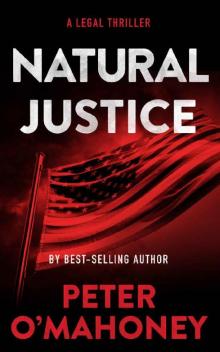 Natural Justice: A Legal Thriller (Tex Hunter Legal Thriller Series Book 6)
Natural Justice: A Legal Thriller (Tex Hunter Legal Thriller Series Book 6)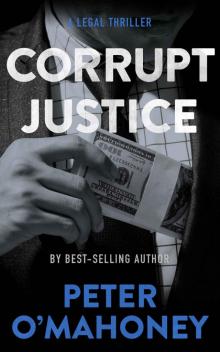 Corrupt Justice
Corrupt Justice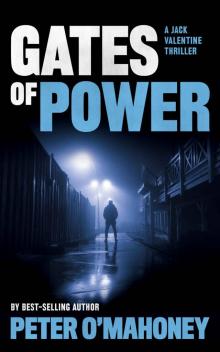 Gates of Power
Gates of Power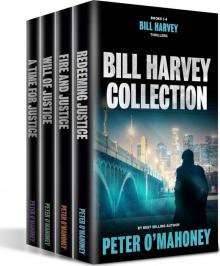 Bill Harvey Collection
Bill Harvey Collection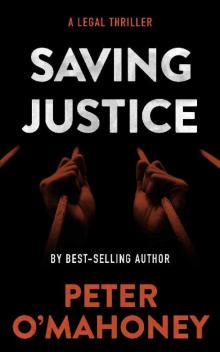 Saving Justice: A Legal Thriller (Tex Hunter Book 5)
Saving Justice: A Legal Thriller (Tex Hunter Book 5)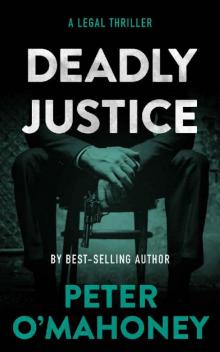 Deadly Justice: A Legal Thriller (Tex Hunter Book 4)
Deadly Justice: A Legal Thriller (Tex Hunter Book 4)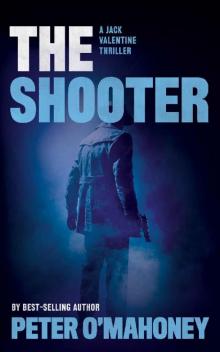 The Shooter
The Shooter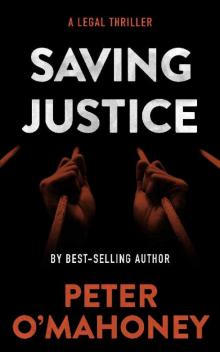 Saving Justice
Saving Justice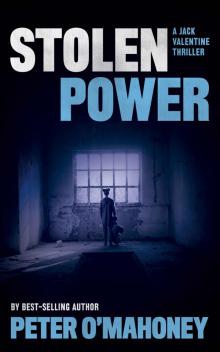 Stolen Power
Stolen Power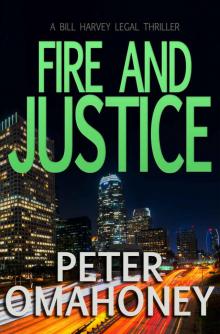 Fire and Justice_A Legal Thriller
Fire and Justice_A Legal Thriller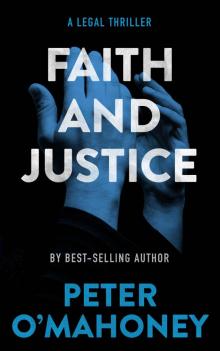 Faith and Justice
Faith and Justice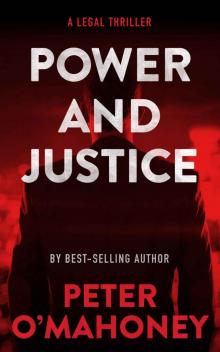 Power and Justice
Power and Justice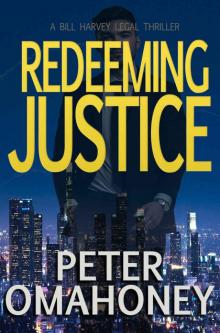 Redeeming Justice: A Legal Thriller (Bill Harvey Book 2)
Redeeming Justice: A Legal Thriller (Bill Harvey Book 2)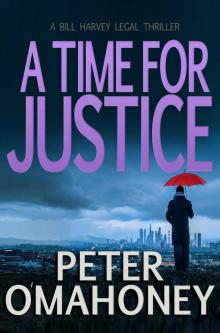 A Time for Justice: A Legal Thriller (Bill Harvey Book 4)
A Time for Justice: A Legal Thriller (Bill Harvey Book 4)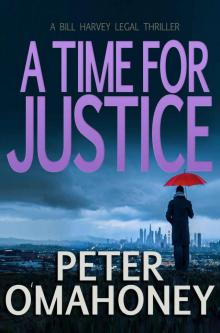 A Time for Justice_A Legal Thriller
A Time for Justice_A Legal Thriller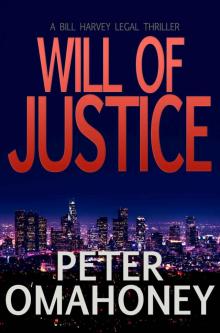 Will of Justice: A Legal Thriller (Bill Harvey Book 1)
Will of Justice: A Legal Thriller (Bill Harvey Book 1)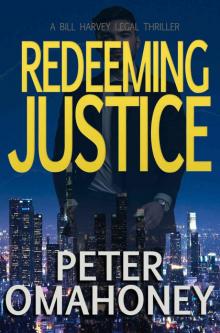 Redeeming Justice_A Legal Thriller
Redeeming Justice_A Legal Thriller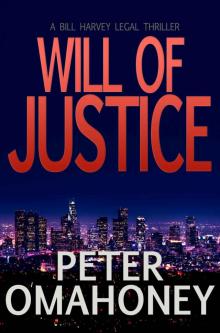 Will of Justice_A Legal Thriller
Will of Justice_A Legal Thriller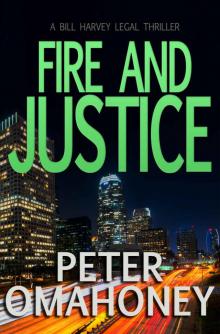 Fire and Justice: A Legal Thriller (Bill Harvey Book 3)
Fire and Justice: A Legal Thriller (Bill Harvey Book 3)